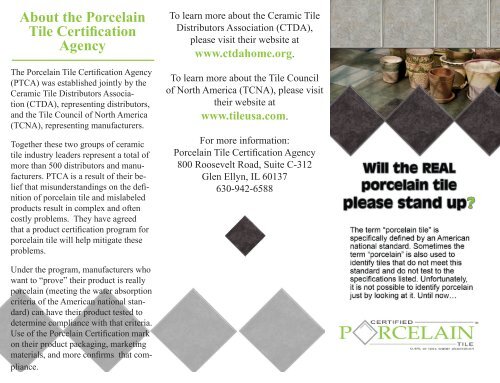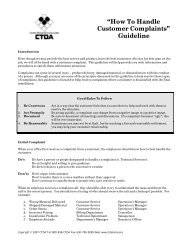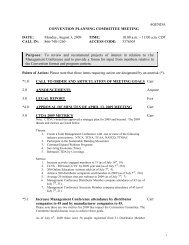About the Porcelain Tile Certification Agency - Ceramic Tile ...
About the Porcelain Tile Certification Agency - Ceramic Tile ...
About the Porcelain Tile Certification Agency - Ceramic Tile ...
You also want an ePaper? Increase the reach of your titles
YUMPU automatically turns print PDFs into web optimized ePapers that Google loves.
<strong>About</strong> <strong>the</strong> <strong>Porcelain</strong><br />
<strong>Tile</strong> <strong>Certification</strong><br />
<strong>Agency</strong><br />
The <strong>Porcelain</strong> <strong>Tile</strong> <strong>Certification</strong> <strong>Agency</strong><br />
(PTCA) was established jointly by <strong>the</strong><br />
<strong>Ceramic</strong> <strong>Tile</strong> Distributors Association<br />
(CTDA), representing distributors,<br />
and <strong>the</strong> <strong>Tile</strong> Council of North America<br />
(TCNA), representing manufacturers.<br />
Toge<strong>the</strong>r <strong>the</strong>se two groups of ceramic<br />
tile industry leaders represent a total of<br />
more than 500 distributors and manufacturers.<br />
PTCA is a result of <strong>the</strong>ir belief<br />
that misunderstandings on <strong>the</strong> definition<br />
of porcelain tile and mislabeled<br />
products result in complex and often<br />
costly problems. They have agreed<br />
that a product certification program for<br />
porcelain tile will help mitigate <strong>the</strong>se<br />
problems.<br />
To learn more about <strong>the</strong> <strong>Ceramic</strong> <strong>Tile</strong><br />
Distributors Association (CTDA),<br />
please visit <strong>the</strong>ir website at<br />
www.ctdahome.org.<br />
To learn more about <strong>the</strong> <strong>Tile</strong> Council<br />
of North America (TCNA), please visit<br />
<strong>the</strong>ir website at<br />
www.tileusa.com.<br />
For more information:<br />
<strong>Porcelain</strong> <strong>Tile</strong> <strong>Certification</strong> <strong>Agency</strong><br />
800 Roosevelt Road, Suite C-312<br />
Glen Ellyn, IL 60137<br />
630-942-6588<br />
Under <strong>the</strong> program, manufacturers who<br />
want to “prove” <strong>the</strong>ir product is really<br />
porcelain (meeting <strong>the</strong> water absorption<br />
criteria of <strong>the</strong> American national standard)<br />
can have <strong>the</strong>ir product tested to<br />
determine compliance with that criteria.<br />
Use of <strong>the</strong> <strong>Porcelain</strong> <strong>Certification</strong> mark<br />
on <strong>the</strong>ir product packaging, marketing<br />
materials, and more confirms that compliance.
<strong>Porcelain</strong> tile is defined by <strong>the</strong> American National Standard (ANSI) A137.1<br />
(1988) as “a ceramic mosaic tile or paver tile that is generally made by <strong>the</strong><br />
dust-pressed method of a composition resulting in a tile that is dense,<br />
impervious, fine-grained, and smooth with sharply formed face.”<br />
<strong>Porcelain</strong> <strong>Tile</strong><br />
<strong>Certification</strong> can<br />
change that.<br />
<strong>Porcelain</strong> tile offers specific wear<br />
characteristics.<br />
Many ceramic tile installations do not require porcelain<br />
tile. But in some cases, porcelain’s dense, impervious<br />
body is necessary to meet <strong>the</strong> environmental<br />
and wear demands of <strong>the</strong> installation. Unfortunately<br />
a lot of tile is mislabeled porcelain when, in fact, it<br />
does not meet <strong>the</strong> specifics of its definition.<br />
For example, because of its low water absorption<br />
characteristics, porcelain tile is considered “frostproof”<br />
and can be used in external applications in<br />
cold environments. If a tile described as porcelain but<br />
not meeting <strong>the</strong> qualifications of porcelain is used in<br />
an exterior installation, it may fail.<br />
When non-porcelain tile is misrepresented, or if<br />
<strong>the</strong>re is simply no proof that a tile meets <strong>the</strong> water<br />
absorption criteria of <strong>the</strong> American national standard<br />
for porcelain, <strong>the</strong> wrong tile may be installed for <strong>the</strong><br />
specifications. Then <strong>the</strong> entire installation is apt to<br />
fail. This is expensive, requiring <strong>the</strong> removal, replacement<br />
and reinstallation of tile. It’s time consuming.<br />
It raises <strong>the</strong> potential for financial liability. And,<br />
it reflects poorly on <strong>the</strong> manufacturer, distributor,<br />
retailer and installer.<br />
This same ANSI standard references ASTM C373 as its recommended<br />
test method.<br />
Producing porcelain tile is a more intensive<br />
and costly process.<br />
As a result, porcelain tile is often more expensive than<br />
o<strong>the</strong>r tiles. Lower cost tiles labeled porcelain but with<br />
higher than standard absorption characteristics can be<br />
misleading. Manufacturers and distributors are aware<br />
of marketplace confusion over what is and is not porcelain.<br />
<strong>Porcelain</strong> certification will verify <strong>the</strong> appropriate<br />
absorption for porcelain tile and assure <strong>the</strong> buyer is<br />
getting <strong>the</strong> desired quality. <strong>Tile</strong> labeled porcelain but<br />
without certification has no comparable assurance.<br />
<strong>Certification</strong> limits liability.<br />
US distributors are responsible for <strong>the</strong> products <strong>the</strong>y<br />
sell and statements <strong>the</strong>y make. If a distributor misrepresents<br />
<strong>the</strong> tile it sells as “porcelain” because it does<br />
not clearly meet <strong>the</strong> US standard water absorption criteria<br />
for porcelain tile, <strong>the</strong> distributor could be subject<br />
to liability. <strong>Porcelain</strong> <strong>Tile</strong> <strong>Certification</strong> will reduce <strong>the</strong><br />
liability to US distributors.<br />
How does<br />
<strong>Porcelain</strong> <strong>Tile</strong><br />
<strong>Certification</strong> work?<br />
<strong>Porcelain</strong> certification offers manufacturers <strong>the</strong><br />
opportunity to certify that <strong>the</strong>ir product meets <strong>the</strong><br />
standard water absorption criteria for porcelain.<br />
<strong>Certification</strong> also validates that <strong>the</strong> tile a distributor<br />
sells will meet that criteria. And end users who<br />
purchase porcelain tile have <strong>the</strong> knowledge that<br />
<strong>the</strong> product will meet <strong>the</strong> required specifications.<br />
• Manufacturers may apply for <strong>Porcelain</strong> <strong>Tile</strong> <strong>Certification</strong><br />
by submitting samples of each tile series<br />
to be tested by a third-party testing organization<br />
to determine compliance with <strong>the</strong> standard water<br />
absorption criteria.<br />
• Manufacturers seeking certification pay <strong>the</strong> costs<br />
of testing as well as initial and annual licensing<br />
fees. Recertification of tile at least every three<br />
years will be required.<br />
• Manufacturers may <strong>the</strong>n use <strong>the</strong> PTCA certification<br />
mark on <strong>the</strong>ir product packaging, marketing<br />
materials, and more as confirmation of that <strong>the</strong>ir<br />
porcelain tile is compliant with PTCA requirements.
















